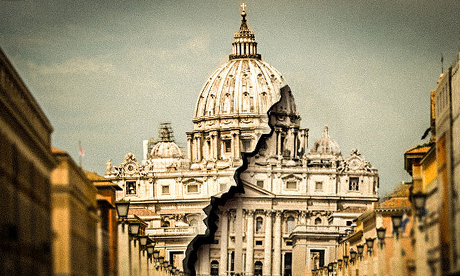Catholic Church unity is facing challenges on multiple fronts, driven by tense dialogues between bishops, open criticism of Pope Francis, claims the Synod report will damage the Church, and the perception of internal persecution.
Synodal Way dispute escalates
At the Council of European Bishops’ Conference in Malta, Bishop Georg Bätzing of Limburg, Germany and Archbishop Stanislaw Gądecki of Poznan, Poland engaged in a tense encounter.
This followed Bätzing’s public accusations against Gądecki for alleged false statements about the Synodal Way.
Bätzing accused his Polish counterpart of “overstepping his authority” and “unbrotherly behaviour” by not raising the issue during the synodal meeting in Rome.
Despite their discussion aiming for Church unity, tensions persisted, highlighting the ongoing discord about the controversial German process.
The Vatican’s recent interventions and Pope Francis’s stance have added weight to concerns, reflecting deeper divisions within the German Church.
Pope Francis acts against Cardinal Burke
Pope Francis has taken significant action against Cardinal Raymond Burke, revoking his subsidised Vatican apartment and salary, citing Burke’s role in fomenting church disunity.
Burke has been a vocal critic of the pope’s Church reforms.
According to an anonymous source, Francis was removing Burke’s privileges because he used them against the church.
The move follows previous clashes between Burke and Francis over doctrinal questions and Burke’s involvement in counter-synodal activities.
Letter to Pope: Synod report will disappoint
Leading reform-minded Catholics, including former Irish president Mary McAleese, penned an open letter expressing concern to Pope Francis and Synod participants.
The signatories anticipate the Synod’s report will “disappoint and wound” Catholics worldwide.
They claim the Synod is one “in which prophetic voices won no significant concessions from the powerful and wealthy forces of conservatism”.
The group found that the Synthesis Report published following last month’s Synod was not “so much a synthesis as the minutes of an apparently unresolved quarrel”.
The quarrel was between an “emerging lay church” and “bishops who have yet to find the courage to let go of their privileges” they said.
Disappointment stemmed from the absence of progress on critical issues like women’s ordination, LGBTIQ rights, celibacy and clerical abuse.
Bishop Strickland’s removal ‘internal persecution’
Bishop Athanasius Schneider has decried the dismissal of Bishop Joseph Strickland as an act of unjust authority, signalling an “internal persecution” against faithful Catholics.
“This will go down in history as a great injustice against a bishop who only did his task in a time of confusion” said Bishop Schneider in an interview with the Catholic Herald.
Schneider described Strickland as a defender of Catholic faith and truth, citing his stance against distortions and his commitment to spiritual growth within the Church.
He criticised the trend of punishing faithful bishops while ignoring those undermining the faith, seeing it as an attempt to silence and dismantle communities adhering to tradition.
Potential for schism
Continued pressure on Pope Francis originates from both the conservative right and liberal left, risking a potential schism.
The right’s resistance poses a threat as they are unlikely to be asked to depart.
At the same time, the left’s dissatisfaction stems from the Church’s apparent inability to tap into its democratic core.
Sources
Additional reading




